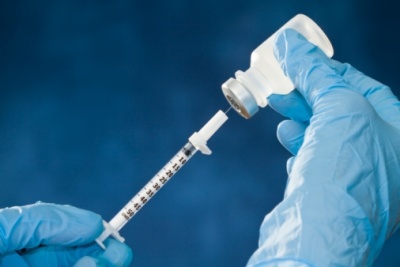Monoallelic point mutations of isocitrate dehydrogenase type 1 (IDH1) are an early and defining event in the development of a subgroup of gliomas1, 2, 3 and other types of tumour4, 5, 6. They almost uniformly occur in the critical arginine residue (Arg 132) in the catalytic pocket, resulting in a neomorphic enzymatic function, production of the oncometabolite 2-hydroxyglutarate (2-HG)7, 8, genomic hypermethylation9, 10, 11, genetic instability and malignant transformation12. More than 70% of diffuse grade II and grade III gliomas carry the most frequent mutation, IDH1(R132H) (ref. 3). From an immunological perspective, IDH1(R132H) represents a potential target for immunotherapy as it is a tumour-specific potential neoantigen with high uniformity and penetrance expressed in all tumour cells13, 14. Here we demonstrate that IDH1(R132H) contains an immunogenic epitope suitable for mutation-specific vaccination. Peptides encompassing the mutated region are presented on major histocompatibility complexes (MHC) class II and induce mutation-specific CD4+T-helper-1 (TH1) responses. CD4+ TH1 cells and antibodies spontaneously occurring in patients with IDH1(R132H)-mutated gliomas specifically recognize IDH1(R132H). Peptide vaccination of mice devoid of mouse MHC and transgenic for human MHC class I and II with IDH1(R132H) p123-142 results in an effective MHC class II-restricted mutation-specific antitumour immune response and control of pre-established syngeneic IDH1(R132H)-expressing tumours in a CD4+ T-cell-dependent manner. As IDH1(R132H) is present in all tumour cells of these slow-growing gliomas15, a mutation-specific anti-IDH1(R132H) vaccine may represent a viable novel therapeutic strategy for IDH1(R132H)-mutated tumours….







